SUPERVERSIVE: The Fatal Flaw of “The Once and Future King”
Tuesday , 10, October 2017 Uncategorized Leave a comment Let me get some stuff out of the way right now.
Let me get some stuff out of the way right now.
“The Once and Future King”, T.H. White’s brilliant retelling of the Arthurian legend based on Malory’s Le Morte De’Arthur, is an incredible book. It is one of the great achievements of literature. “The Ill-Made Knight” is the second best fantasy novel of all time. The final scene of “The Candle in the Wind” stands today as one of the most moving scenes ever written. It is a masterpiece.
And it is based around a fundamental, foundational error, and error that leads directly to White’s conclusion that Camelot is an impossible dream: White’s disbelief in Original Sin, and the corollary of the impossibility of redemption.
The error first starts to pop up in the final scenes of the second book in the cycle, “The Queen of Air and Darkness”. Here White frames the fall of Camelot as a Greek tragedy, impossible to prevent, and bases it around the conception of Mordred between Arthur and his half-sister, who he was tricked into sleeping with. He states his thesis here:
Even if you have to read it twice, like something in a history lesson, this pedigree is a vital part of the tragedy of King Arthur. It is why Sir Thomas Malory called his very long book the Death of Arthur. Although nine tenths of the story seems to be about knights jousting and quests for the holy grail and things of that sort, the narrative is a whole, and it deals with the reasons why the young man came to grief at the end. It is the tragedy, the Aristotelian and comprehensive tragedy, of sin coming home to roost. That is why we have to take note of the parentage of Arthur’s son Mordred, and to remember, when the time comes, that the king had slept with his own sister. He did not know he was doing so, and perhaps it may have been due to her, but it seems, in tragedy, that innocence is not enough.
White, T. H.. The Once and Future King (p. 308). Penguin Publishing Group. Kindle Edition.
But White is wrong, and in fact contradicts his own conclusion in “The Candle in the Wind”. The foundational sin of Camelot was not Arthur’s innocent error, but his far more damnable sin committed in response to that error, the murder of the nineteen infants:
[Everyone who learned I slept with my half sister] frightened me with horrible prophecies, and I did something which has haunted me ever since. Our mother had hidden Morgause away as soon as it was known.”
“What did you do?”
“I let them make a proclamation that all the children born at a certain time were to be put in a big ship and floated out to sea. I wanted to destroy Mordred for his own sake, and I didn’t know where he would be born.”
“Did they do it?”
“Yes, the ship was floated off, and Mordred was on it, and it was wrecked on an island. Most of the poor babies were drowned—but God saved Mordred, and sent him back to shame me afterwards. Morgause sprang him on me one day, long after she had got him back.
White, T. H.. The Once and Future King (p. 553). Penguin Publishing Group. Kindle Edition.
That White sees Arthur’s misidentification of his half sister as the central sin of Camelot rather than his willful murder of 19 infants is one of the major blindspots – perhaps the only major blindspot – of the series, and it again stems from White’s denial of Original Sin. To White, people are Good or, if they are not Good, are victims of fate beyond their control – like Mordred, or even Lancelot. White doesn’t allow the idea of redemption, because the idea that humans are flawed and need to make up for their messing up is literally not even on his radar. If people are flawed, it is not their fault, something he makes clear again and again. Laterr with Arthur it is his lack of condemnation for Arthur’s incest or infanticide. Earlierer he absolves Lancelot of all his many crimes:
The cheers which now began, round after round, were like drumfire or thunder, rolling round the turrets of Carlisle. All the field, and all the people in the field, and all the towers of the castle, seemed to be jumping up and down like the surface of a lake under rain.
In the middle, quite forgotten, her lover was kneeling by himself. This lonely and motionless figure knew a secret which was hidden from the others. The miracle was that he had been allowed to do a miracle. “And ever,” says Malory, “Sir Lancelot wept, as he had been a child that had been beaten.”
White, T. H.. The Once and Future King (p. 520). Penguin Publishing Group. Kindle Edition.
So Lancelot knows he is a broken and sinful man and he is still able to perform a miracle, because Lancelot is still Good; his sins are fate, destiny, and he is not to blame for them. This robs him of an opportunity for redemption and it is this that makes the fall of Camelot inevitable. Arthur says as much at the end of the series:
Long ago, when his mind had been a nimble boy’s called Wart—long ago he had been taught by an aged benevolence, wagging a white beard. He had been taught by Merlyn to believe that man was perfectible: that he was on the whole more decent than beastly: that good was worth trying: that there was no such thing as original sin. He had been forged as a weapon for the aid of man, on the assumption that men were good. He had been forged, by that deluded old teacher, into a sort of Pasteur or Curie or patient discoverer of insulin. The service for which he had been destined had been against Force, the mental illness of humanity. His Table, his idea of Chivalry, his Holy Grail, his devotion to Justice: these had been progressive steps in the effort for which he had been bred. He was like a scientist who had pursued the root of cancer all his life. Might—to have ended it—to have made men happier. But the whole structure depended on the first premise: that man was decent.
White, T. H.. The Once and Future King (p. 637). Penguin Publishing Group. Kindle Edition.
So, the question becomes: What if knights repent in a world where repentance is possible? What if the fall of Camelot is not fate, but Camelot can live if men overcome their flaws? What if your sin doesn’t seal your fate, and your goodness isn’t assured, but it is always possible for you to rise from the ashes even at your lowest point?
These were questions I asked in “Tales of the Once and Future King”, and if you would like to know what happens when sinful men work their ways towards second chances, I encourage you to give it a shot.

Please give us your valuable comment